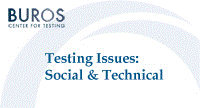Buros-Nebraska Series on Measurement and Testing

Social and Technical Issues in Testing: Implications for Test Construction and Usage
Date of this Version
1984
Document Type
Article
Citation
Published in Social and Technical Issues in Testing: Implications for Test Construction and Usage, edited by Barbara S. Plake (Hillsdale, NJ: Lawrence Erlbaum Associates, 1984).
Abstract
What a happy occasion it is to celebrate, as we do in this volume, the establishment of a national Buros Institute of Mental Measurements, located on the campus of the University of Nebraska, in Lincoln. What a culmination of many plans, hopes, and dreams! On such an occasion, we can take a quiet pride in our profession and in the life and accomplishments of one of our colleagues and friends, Oscar Krisen Buros, who with Luella Buros is leaving to us, and our posterity, an institution of integrity to foster the science and practice of testing.
How new all this field really is: According to Stanley and Hopkins (1972, p. 163), the first large-scale testing was done in the City of New York Survey, in 1911. Oscar Buros was 6 years old then, so we can think of most of the astonishing developments in measurement really happening during his lifetime. And the first machine for scoring of answer sheets, the old IBM 805, was developed when Oscar was 30. Many of us can remember, only 20 years ago, many clerical workers reading the dials from these machines and writing the scores as they might be estimated from this analog device. Then these tools also became obsolete as the field was overtaken by optical readers and computer scoring. So Oscar and Luella Buros have witnessed the explosion of testing into a central institution of education, of psychology, of all the social and behavioral sciences. But they have done much more than witness: Their publications have served as a steady center of this growth, and their independence has established a tradition of reputation and honor as a goal, if not always as a realization, of the profession and the practice of testing.
The establishment of such published symposia from the Buros Institute is an important further step. There is a major place for such a forum. I hope these symposia will represent a determined effort to stand apart from the testing giants, just as Buros did, and to remain independent of federal agencies as well. The Institute, and these symposia, should continue to sponsor solid, sometimes severe criticism of tests and test practices, also as Buros did. They should similarly stand apart from the political huckstering and trend riding, the cheap shots against testing, and apart from the constant distortion of what tests tell us about ourselves and our world.
Of course, the Institute should make full modern use of word-processing, automatic mailing, information retrieval, and all the present and future efficiencies of operation becoming available. But hopefully there will remain these steady principles that marked Buros' work, and a similar vision of mental measurement, of how it can help our society to be happier and more productive.


Comments
Copyright © 1984 by Lawrence Erlbaum Associates. Digital edition copyright © 2012 Buros Center for Testing. This book may be downloaded, saved, and printed by an individual for their own use. No part of this book may be re-published, re-posted, or redistributed without written permission of the holder of copyright.